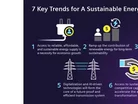APAC energy leaders identify 7 key trends for sustainability

More than 2,500 regional and global business leaders, policy makers and government representatives across the energy sector came together for the first-ever Siemens Asia Pacific Energy Week to discuss regional challenges and opportunities.
Held virtually March 9-10, the focus of this year’s event, Shaping the Energy of Tomorrow, was all about fostering an ecosystem of collaboration and co-creation between stakeholders within Asia Pacific to help meet the world's sustainability goals, boost economic growth, create new jobs and industries, improve human welfare and attain carbon neutrality by 2050.
7 key trends for energy sector to focus on
Following a lineup of panel sessions and discussions, energy leaders arrived at 7 key trends that the sector should focus on for a successful transition towards a sustainable energy future.
- Access to reliable, affordable and sustainable energy supply is a necessity for economic growth
- Ramp up the contribution of renewable energy for long-term sustainability
- Utilize technology for efficient and cleaner use of energy
- Embrace emerging and cleaner energy resources like Green Hydrogen
- Digitalisation and AI-driven technologies will form the core of a future-proof and efficient transmission system
- Access to sustainable, competitive capital will accelerate the energy transformation journey
- Collaboration among stakeholders is imperative for the transformation of the energy landscape
APAC accounts for half of global energy consumption
As the world’s fastest growing economic region, Asia Pacific is witnessing increasing urbanisation, rising population and with it, huge energy demands.
With Asia Pacific accounting for more than half of global energy consumption, and with 10% of the population still lacking access to basic electricity, “the question is how to bridge into an affordable, reliable and sustainable power supply, while improving energy access," says Christian Bruch, President and CEO, Siemens Energy.
As prices of renewables decline and grid stabilisation technology advances, accelerating the contribution of renewable sources makes economic sense and will also drive long-term sustainability for the region.
Governments can contribute with policies and regulations driving this change, and the industry can translate emerging business strategies into practical busines models, as well as develop reliable projects and drive technological innovations. To step up the energy transition, all stakeholders must join forces and work towards the transformation.
Key energy event takeaways
Audience engagement during the event further revealed some vital insights on energy transition in the region:
- More than 45% of the participants indicated that cost was a major hurdle followed by willingness for energy transition at nearly 25%
- Over 66% identified renewable integration as the most impactful decarbonisation element
- 48% voted that a breakthrough in energy storage will accelerate energy transition
- 75% of participants would be willing to pay a premium for CO2 free energy, and...
- Policy and regulation will be a key motivator.



